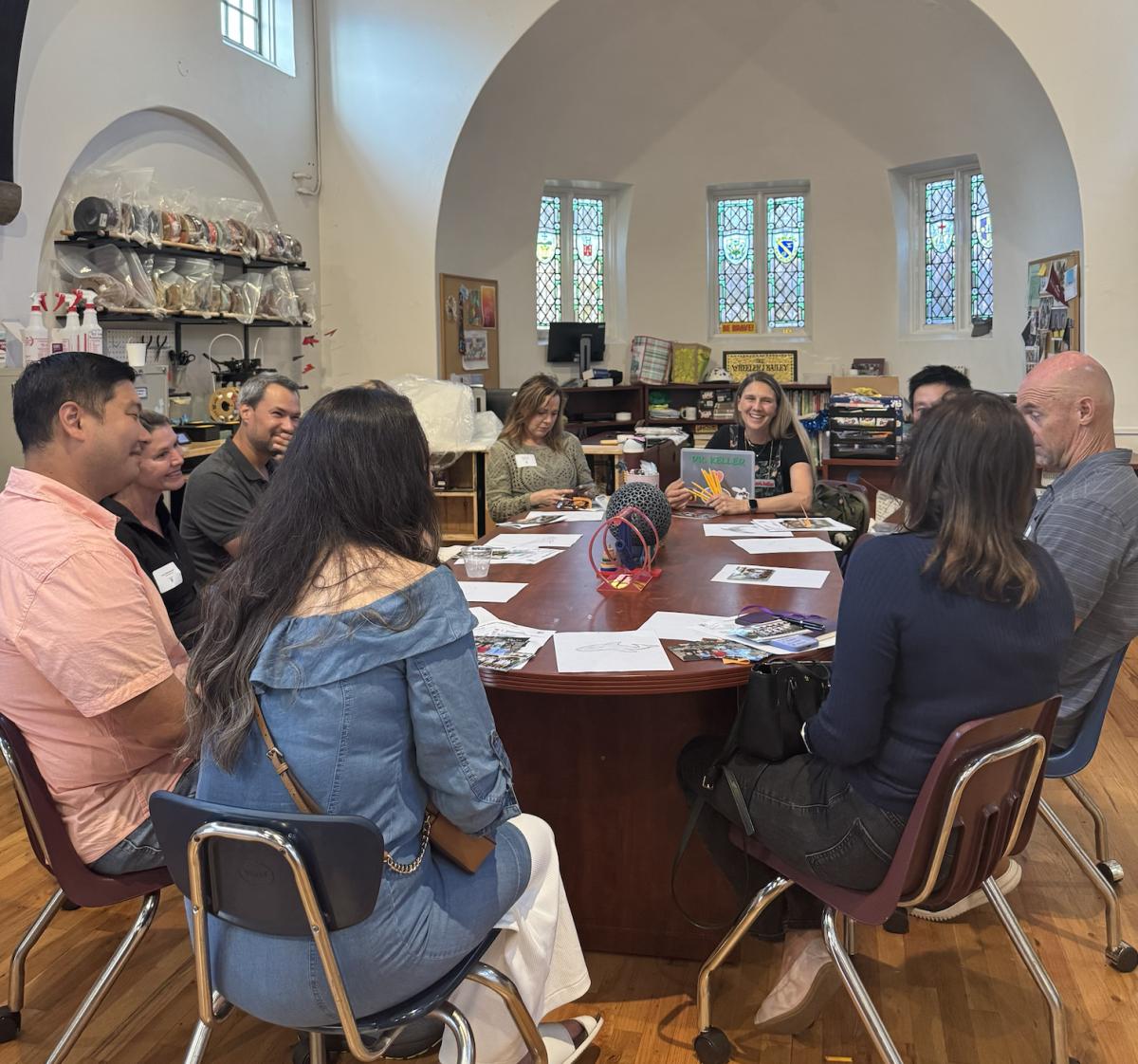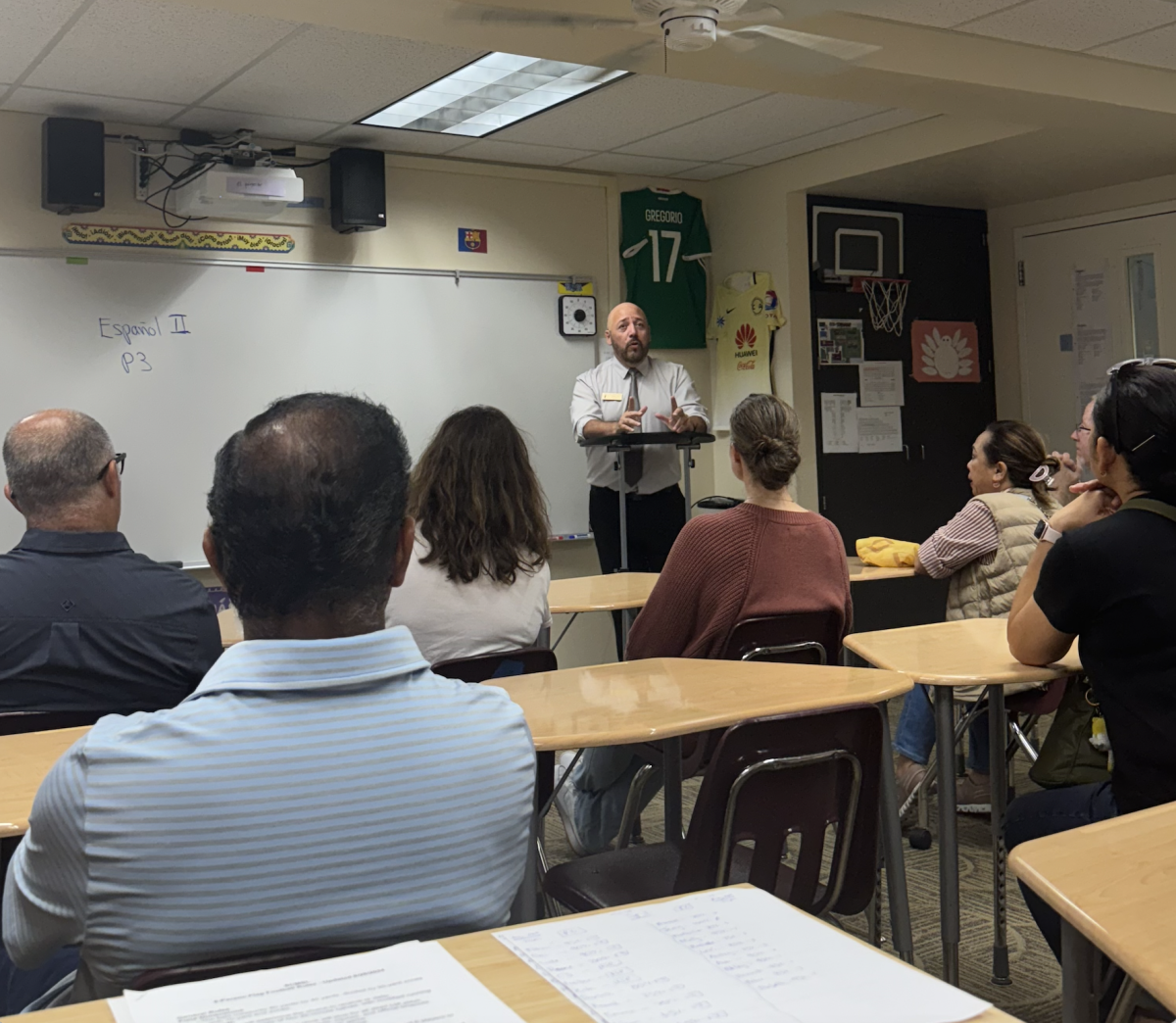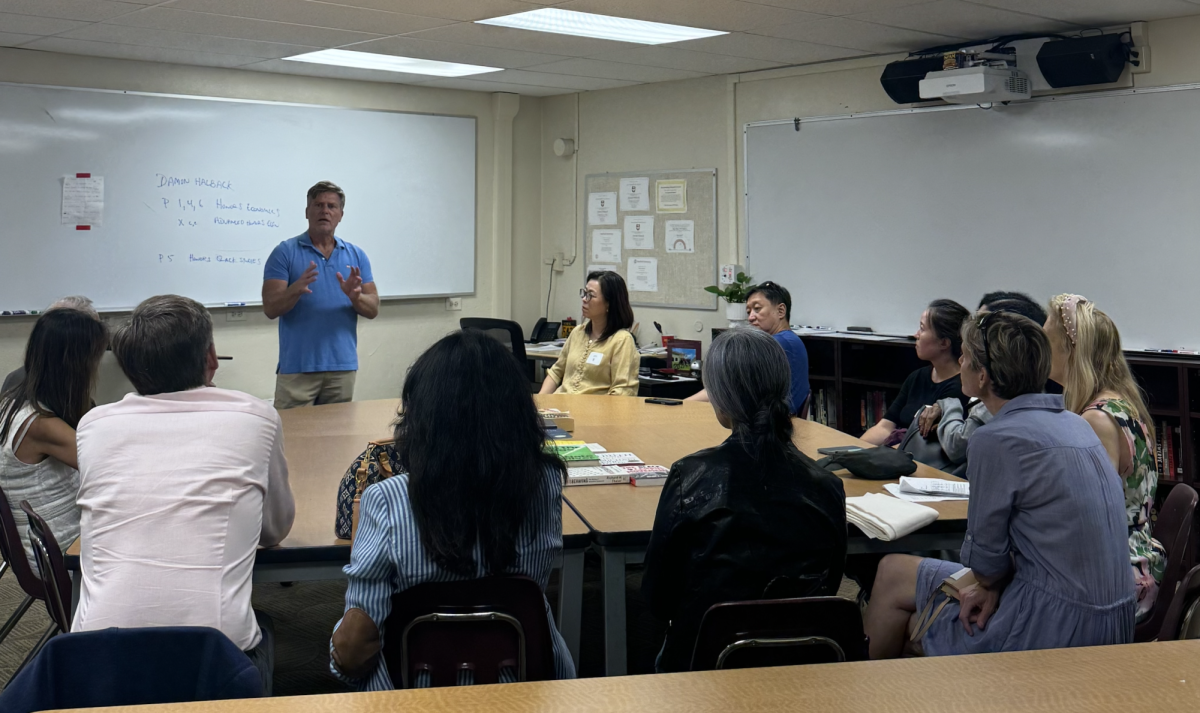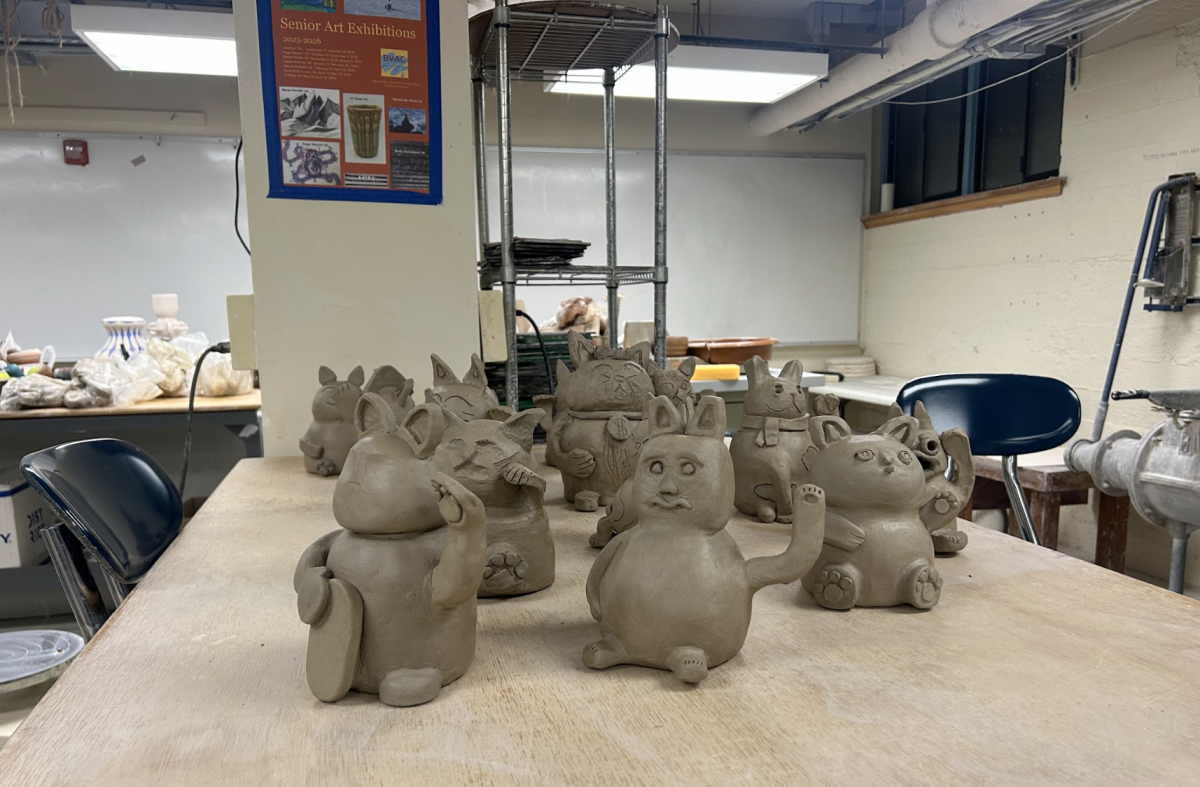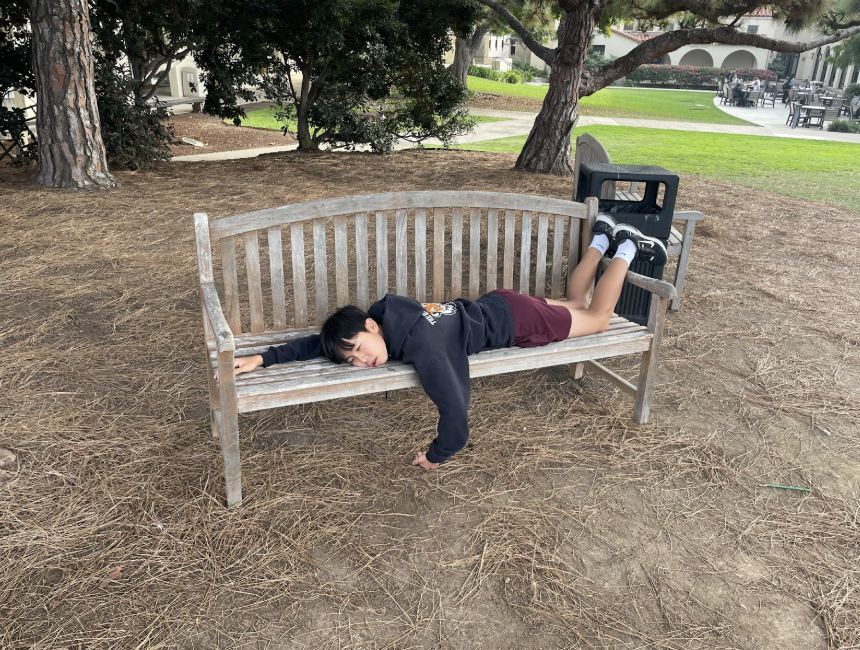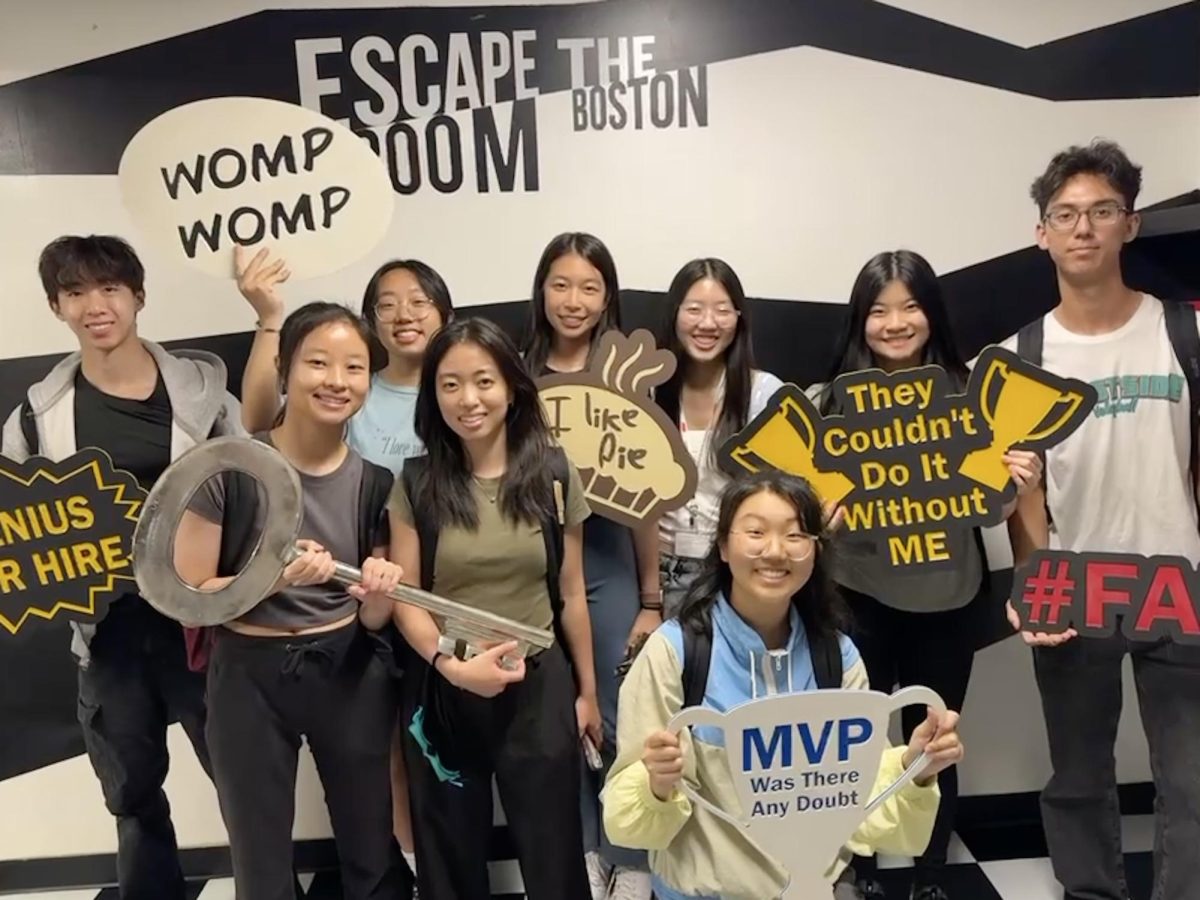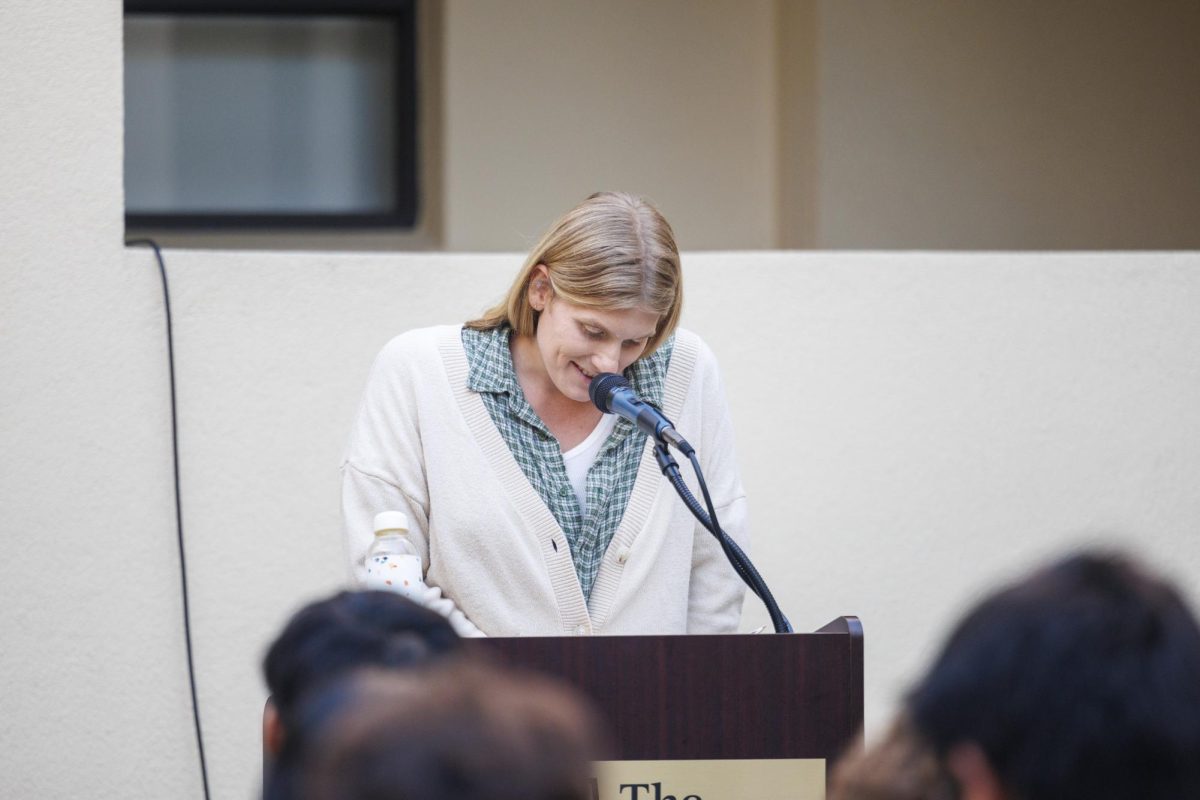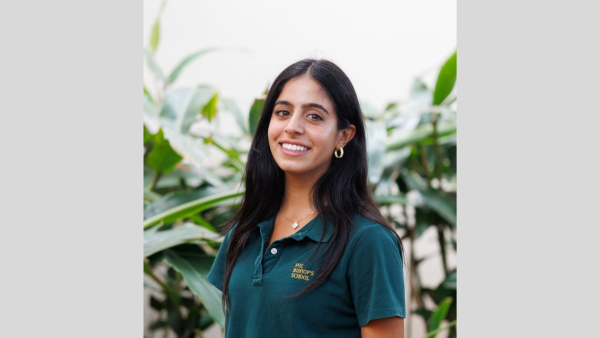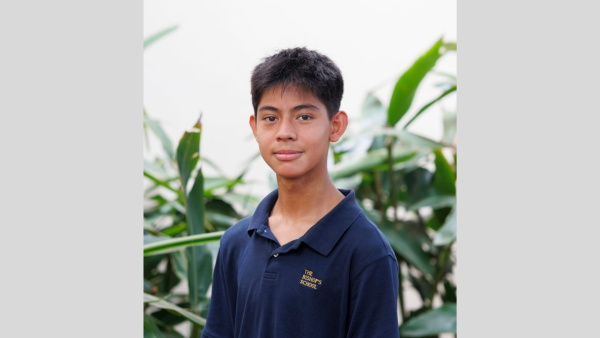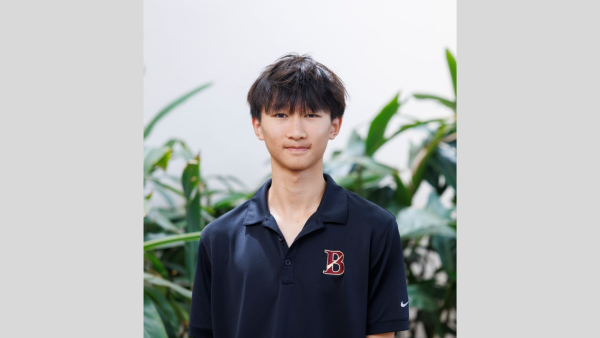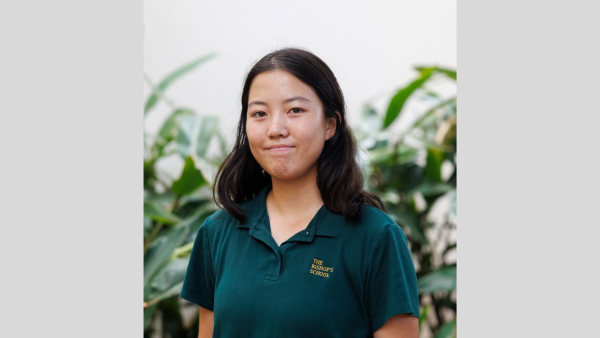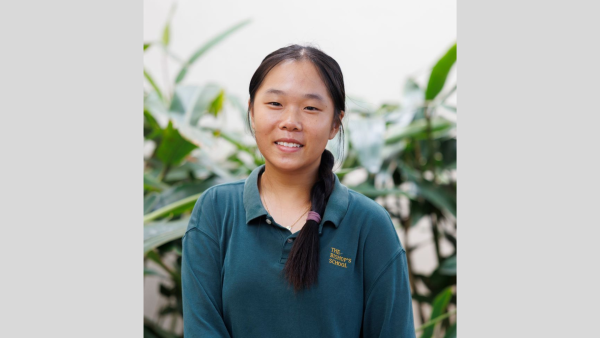Bishop’s welcomed parents and guardians back to campus for the annual Back to School Knight (BTSK) on September 18, 2025. The evening began with mingling and lemonade on the Rohr terrace before parents followed a condensed version of their children’s daily schedule, attending ten-minute classes across campus. From Harkness discussions to optical illusions and even a quick history quiz, the event offered families a glimpse into life as a Bishop’s student and exposed them to the dedicated teachers who make it all happen.
Parent Mingle Time and Opening Speech 5:00 – 5:40
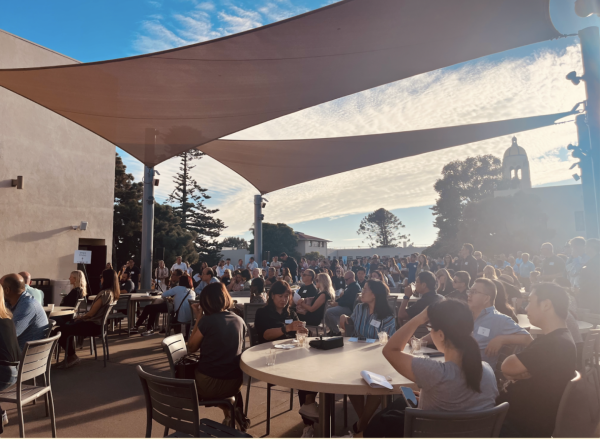
At 5:25 p.m., Head of School Mr. Ron Kim gave his opening speech, introducing the special occasion. “Bishop’s is all about snacks,” he said, which received a few chuckles from the crowd of parents. Mr. Kim explained the schedule for the evening, starting with the 20-minute advisory block, which he referred to as the “most luxurious period of time tonight.” He followed by explaining the rest of the periods, as well as the goal of Back to School Knight: to give parents a glimpse of what their children experience every day.
Mr. Kim closed his speech by announcing his Back to School Knight shadow for this year, Allison Vano (‘31) — a student whose schedule he will follow for the evening, which is something he does annually — and wishing the parents a great and enjoyable night. After his speech, when asked about his favorite part of Back to School Knight each year, he responded, “My favorite thing is how parents feel at the end of the night. … They’re just so excited about this opportunity that they have provided for their children.” He added, “Nothing makes them happier than to know that they’ve given their kids a really special opportunity.”
When asked about her feelings toward Back to School Knight, Mrs. Ruchika Rastogi (Shreya ‘28 and Ashali ‘28) said, “I’m super excited about Back to School Knight. I love seeing all the other parents, meeting the teachers, and getting all the free snacks on campus.”
Advisory 5:45 – 6:05 p.m.
Ninth-grade advisory with Dr. Lani Keller took place in the Creative Sciences Center, a warm space of wooden walls and the hum of 3D printers and other projects in progress. Parents leaned around a large circular table as Dr. Keller passed around photographs of their children, pointing out different people and activities. The photos sparked introductions and conversations, as parents shared stories about their kids and learned about their peers’ interests.
Dr. Keller set the tone by sharing about her own son, Bex, and his love of volleyball, then emphasized her role as an advisor. She said, “I’m here to support your kids, period. I’m here when there’s an issue with grades, with faculty, with you guys … I really want to be a support system for them these next four years.” Parents also participated in advisory traditions, writing notes for the color-coded memory jars that students build over their four years.
Meanwhile, in Ms. Nicole Uhland’s tenth-grade advisory, parents observed a classroom filled with personal touches. Photos from retreats, small objects collected throughout the years, snacks filling cabinets, and a welcoming atmosphere that reflected the close-knit advisory culture. Ms. Uhland began by warmly welcoming the parents and guiding them through the short routine of her advisory every morning, including some light-hearted “would you rather” questions, a small ritual she uses to make sure the students’ day starts on a positive note.
Parents like Mrs. Lori Shearer (Zachary Haubenstock ‘28) notice how much Ms. Uhland cares for each and every one of her advisory students.
Eleventh-grade advisory with Coach Meghan Carr focused on the practical aspects of students’ academic life, openly addressing the “elephant in the room”: the looming college process. Parents sat watching as she moved through the whiteboard covered with test dates, assignment reminders, and upcoming deadlines, showing the same methodical approach she uses that guides her students each morning. Coach Carr labeled herself as a “helicopter advisor,” someone who stays close enough to ensure nothing slips through the cracks. The period struck a balance between structure and support, showing parents how advisory serves as more than a quick check-in, but a moment to steady students before their day takes off.
Period 1 6:12 – 6:22 p.m.
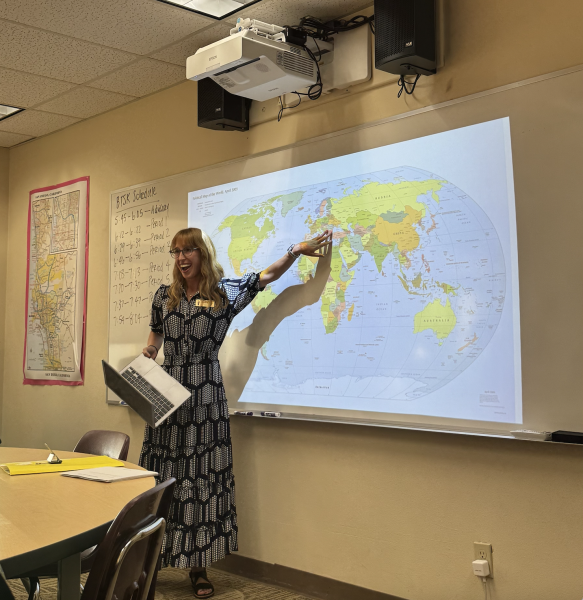
Parents moved from advisory into the classroom in Upper Scripps for modern World History, where History Teacher Ms. Abby Perelman welcomed them into a space filled with maps, graphics, and visual aids that reflected the approach to her course. Ms. Perelman welcomed them and began by explaining how the class isn’t a simple “chronological march through history,” but an exploration of competing narratives and perspectives. From the Industrial Revolution to imperialism in Africa, she emphasized not only the events themselves, but the skills students develop along the way: expressing ideas clearly in writing, listening actively, collaborating with classmates, and cultivating empathy for different viewpoints.
As parents listened, they could see how these lessons shape the rhythm of students’ days. Ms. Perelman shared tips for supporting students at home, like creating a focused study space and encouraging active engagement with materials rather than simply logging hours. Parents even dove into a quiz, naming countries in Africa, leaning over their papers and maps, finding themselves caught up in the same challenges students face each day.
Through Harkness-style discussions and open-ended questions, parents saw the classroom’s constant motion. The exchange of ideas, the attention to detail, and the push to think critically and independently all create an atmosphere of participation and reflection that carries through the school day.
Between the Harkness-style discussions and open-ended questions, parents got a real sense of the constant motion in the classroom, the give-and-take of ideas, the careful attention to detail, and the way each activity nudges students to think critically and independently. From analyzing competing perspectives to struggling over naming countries, every moment of the period felt intentional, an atmosphere set for collaborating and learning, framing a deliberate rhythm for the school day: a balance of thinking, speaking, and reflecting that threads through the students’ days.
Parents settled cozily into their seats, pencils in hand, as Math Teacher Dr. Jay Zhao passed out questionnaires. The room buzzed with quiet concentration, a blur of scribbles and thoughtful faces, almost like a mini math quiz in progress. Dr. Zhao introduced himself, sharing his Chinese name, his college, and a glimpse into his passion for number theory. He walked parents through the Harkness-style approach in math, emphasizing problem-solving, critical thinking, and collaboration as essential skills, not just for the classroom, but for life beyond Bishop’s.
He guided them through the structure of Math 5E, explaining that the topics covered are exclusive to this class and that critical thinking is a skill that must be practiced and trained. Parents got a taste of Harkness-style discussions and an emphasis on collaboration, as well as the Exeter book and the course’s focus on problem-solving. Dr. Zhao emphasized that creativity and teamwork are essential, giving parents a clear sense of the engagement of the class.
Period 2 6:29 – 6:39 p.m.
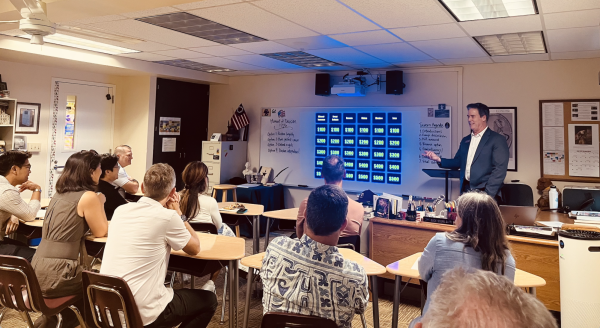
(Bodhi Landin)
Parents stepped into Math Teacher Mr. Daniel Clark’s classroom for Math 4E and were immediately greeted with an “about me” slide, introducing him as a teacher in his nineteenth year of teaching and fifth at Bishop’s, as well as a coach and founder of a youth basketball training company. The room buzzed with energy as Mr. Clark described his class as “Not your traditional math class,” emphasizing that students don’t just passively learn but actively engage, explore, and apply concepts with guidance. Parents could see that the class centers on problem-solving and student collaboration, with Mr. Clark serving more as a facilitator than a lecturer.
Mr. Clark then guided parents through the structure of the class, describing the student-centered approach where learners actively tackle problems rather than passively receive instruction. He showcased some of the topics for the semester and explained how students learn by working through challenges and supporting one another. The atmosphere felt collaborative and energetic, with Mr. Clark encouraging effort over perfection and highlighting the sense of community he cultivates in class. Parents could see how students are constantly pushed to think critically, ask questions, and grow, while always knowing that help is available when needed.
Parents entered the classroom for History Teacher Dr. Jeff Geoghegan’s Honors Comparative Government course and were immediately immersed in a lesson that spanned countries from Mexico to China. Dr. G guided the group through history, starting with a flight to the UK to visit Buckingham Palace and explore the role monarchy plays in Great Britain, including the House of Parliament, and the five political parties, connecting these firsthand experiences to a larger discussion about monarchy, debate, and governance. The class highlighted the importance of comparing political systems and the idea that, without comparison, the mind cannot fully understand its own system.
The class blended history, current events, and problem-solving in a way that was both visual and interactive. Parents participated in a Jeopardy-style review, testing their knowledge of different governments and the challenges facing the world today, which gave them a sense of how students actively engage with the material. Mrs. Dova Roper (Kalia ‘26, Dova ‘29, and Lucas ‘31) said the class was almost like a game, drawing students in and keeping them thinking on their feet. She added that she was grateful her children are learning not just facts, but how to analyze the world critically, connecting historical context to the challenges of today and building skills they can carry beyond the classroom.
Period 3 6:46 – 6:56 p.m.
As parents entered English Teacher Ms. Amy Allen’s Advanced Honors English class, they instantly started conversing. Advanced Honors English is only offered to seniors, so there’s no doubt that many have already become familiar with each other over the years. Ms. Allen went around the Harkness table, shaking parents’ hands and briefly introducing herself.
At 6:46 p.m., class officially started, and Ms. Allen invited parents to introduce themselves and to explain who their children are. Despite being in her 20th year at Bishop’s, she had never done a PowerPoint presentation in the past before. So she decided, “Why not do one tonight?” Ms. Allen started the PowerPoint by introducing herself and her family, and sharing hopes for students when exploring the subject of English: “I hope it inspires them in some ways or makes them more empathetic,” she said.
Ms. Allen continued by going through books that the course would cover, as well as introducing Harkness discussions to parents. She believes that the Harkness table and discussion format allow for kids to “connect with each other, get to know [each other], see each other” as well as “learn and grow from each other.” On the topic of getting better at writing, Ms. Allen said that “being here, showing up every day transforms them, not a single moment.”
Ms. Allen ended the class with a heartfelt reading of “My Heart Leaps Up” by William Wordsworth (1807), allowing parents to ponder the poem before proceeding to their next classes.
Period 4 7:03 – 7:13 p.m.
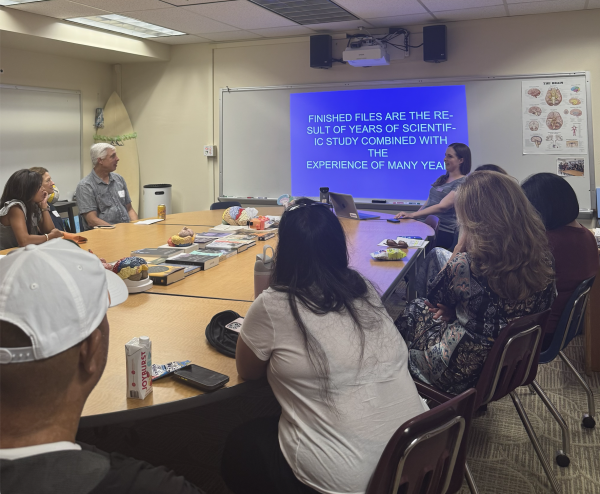
In the computer science lab, Computer Science Teacher Mr. Darren Cameron introduced his Software Development class by sharing the philosophy behind his teaching. “The more tools in your toolbox, the better,” he said, as he walked parents through the range of programming languages students learn throughout the year. He showcased a project completed earlier that very day and previewed an upcoming fitness-tracking app that students will design later in the semester. Parents seemed impressed by his points about the rigor and the creativity of the course.
“Mr. Cameron’s presentation gave a really good understanding of what the course will be like,” said Beckett Langager’s (‘29) father, Todd Langager, adding that it was exciting to see the kind of projects their kids would create.
Up the stairs of Scripps, Honors Psychology Teacher Ms. Karri Woods explained why Honors Psychology is one of her favorite classes to teach. With ten years of experience, she highlighted how psychology resonates deeply with juniors and seniors preparing for the next stage of their lives. Parents got a taste of her interactive approach when she flashed different optical illusions/mind tricks on the screen.
One of them included the phrase “Paris in the the spring,” which, she explained, our brain immediately skips over formatting words like the second “the” and reads it as “Paris in the spring”. From visual perception tricks to mental shortcuts, her ten-minute session showed the parents how psychology reveals the biases and quirks of everyday thinking.
Period 5 7:20-7:30
For parents in Statistics Teacher Mr. Juan Vidal’s Honor Statistics class, the session began with a lighthearted “About Me” assignment before shifting into the nuts and bolts of course expectations, like projects, grading, and common student challenges.
I think it’s really good that Tommy is taking this [class],” said Jana Kenney (Thomas ‘26). She thinks that it will “help him get his logic straight … and how to problem solve by collecting data and logical deduction.” She added that this year’s Back to School Knight had been “one of the best we’ve experienced,” thanks to the enthusiasm of the teachers.
Meanwhile, in Honors Western Thought and Culture, History and Social Science Teacher Mr. Matthew Valji joked about his roots as a San Diego native and La Jolla High graduate before tackling the big question: why study Western Culture at Bishop’s?
From ancient Rome to modern Europe, he explained how Western traditions shape language, travel, education, etc. His humor and knowledge kept parents engaged, as he reminded them that even in a city with a Spanish name and at an Episcopal school, understanding the roots of Western influence is very important.
Period 6 7:37 – 7:47
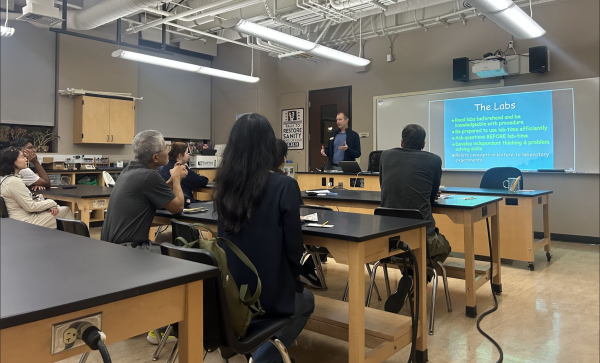
In Conceptual Physics Enriched, Science Teacher Mr. Ben Heldt gave the ninth-grade parents a glimpse into his hands-on approach with a playful demo involving colored lights, recalling how students begin their first day exploring the physical properties of light and sound.
Meanwhile, in Honors Biology, Science Teacher Mr. Benjamin Duehr began by asking parents to jot down one fact about their child that he wouldn’t know, a tradition that helps him connect personally with his students. Mr. Duehr walked parents through the rigour of his course, including the 20 (mini) quizzes per semester, almost every class designed to develop good study habits.
He shared his highlights from the class’s first major lab on enzymes and explained the digital tools he takes advantage of, like EDpuzzle and Formative, that help students engage with complex content.
Parents left all Period 6 science classrooms buzzing with both admiration and nostalgia, many recalling their own high school days.
“I’m so impressed,” said Yong Zeng (Sophie ‘26), who took biology in high school himself. “I think everybody should learn some biology.”
Period 7 7:54 – 8:04
Hidden in the secret basement in between the library and the bookstore is Ceramics Teacher Mr. Jeremy Gercke’s ceramics classroom. As parents walked into the classroom, the pungent yet fresh smell of clay filled their nostrils. As they sat in the tall seats students normally sit in, Mr. Gercke proudly presented student pieces to them: carefully crafted asian cats.
“Ceramics don’t just take a day, but maybe even a couple of weeks,” he said. Students spent two weeks creating the asian cats — detailing their pieces to impress their parents while polishing their ceramics skills. Parents then tried to guess their child’s cat, which proved to be a pretty difficult task.
When asked about the class, Mrs. Mieshia Hamilton-Maye (Amaree ‘29) commented, “It’s great to come in and see all the work that [the kids are] putting in and how much they’ve done just the first beginning of the school year.”
In Upper Scripps, Honors US History Teacher Dr. Charissa Keup greeted parents with an ear-to-ear smile, whilst handing them a short quiz on American History. Up on the board, Dr. Keup had a slideshow projected for the night. “I put up a photo of a koi fish so students remember how to pronounce my last name,” she said.
Dr. Keup then introduced herself and her family, and also touched on differences between Modern World History (which students took in ninth grade) and United States History, as well as American History 8: “We’re learning a lot, we’re going into depth, we’re going into detail,” she said. When addressing the increased workload from previous years, Dr. Keup explained that “it’s like training … like sports … the more [they] practice the better we get at it, the faster they get at it.”
Dr. Keup ended the night by taking parents through a sample day of what students do every class: they start with a fun check-in where students choose the picture that best represents how they’re feeling, followed by a mini presentation, primary source reading and analysis, and group discussion. After the class, Mrs. Susan Yang said, “The structure of the class sounds really interesting … starting class off in such a fun way is a great idea.”
The End of the (K)night
As the last bell rang and the campus became dark, parents filed out of the classrooms with a mix of energy and exhaustion. Some laughed about tricky math puzzles that their students’ teacher made them attempt, or mind-messing optical illusions that were projected on the board in Psychology. Like in the shoes of their children, they had just completed a full day of classes, packed into 3 hours.
Parents left campus with a clearer understanding of the world of their kids as a Bishop’s student and new bonds/appreciation for the teacher’s guiding them through it!


